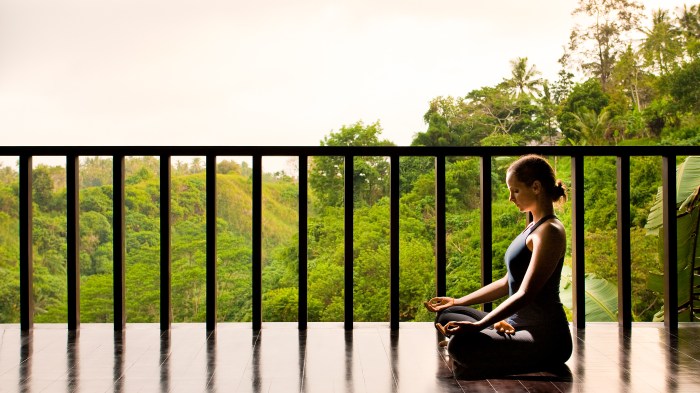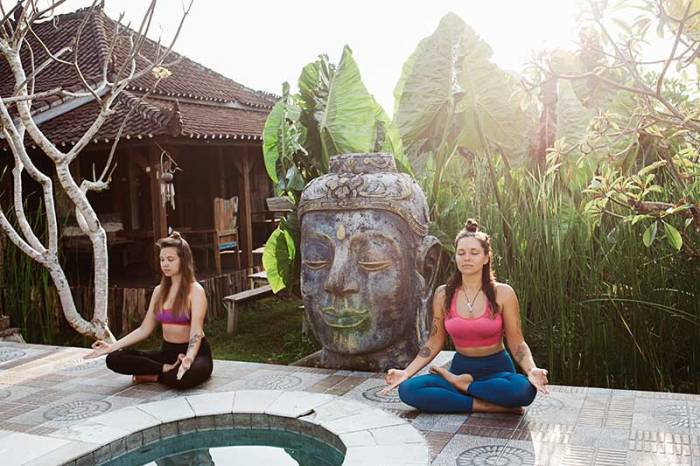Hotels That Host Destination Yoga And Wellness Retreats
Hotels That Host Destination Yoga and Wellness Retreats invite you to explore a world where serenity and rejuvenation come together. These retreats offer a unique escape, allowing individuals to disconnect from the daily grind and immerse themselves in various wellness practices designed for healing and growth. From yoga sessions overlooking pristine beaches to nourishing meals made with local ingredients, these experiences provide a holistic approach to wellness.
As you embark on this journey, you will discover the many benefits of attending such retreats, including enhanced physical health, mental clarity, and a deeper connection with yourself. The carefully curated wellness programs cater to different needs, making it easier to find the perfect fit for your personal wellness goals.
Overview of Destination Yoga and Wellness Retreats

Source: byrdie.com
Destination yoga and wellness retreats offer a unique blend of relaxation, self-discovery, and holistic healing, all set against breathtaking backdrops. These retreats attract individuals seeking a temporary escape from their daily routines to recharge their bodies, minds, and spirits. Often held in serene locations such as tropical beaches, tranquil mountains, or lush countryside, they provide the perfect environment for reflection and rejuvenation.Attending a destination yoga and wellness retreat presents numerous benefits, both physically and mentally.
Participants typically experience enhanced flexibility, improved strength, and increased mindfulness through daily yoga practices. Moreover, these retreats foster a sense of community, allowing attendees to connect with like-minded individuals, share experiences, and forge lasting friendships. The immersion in wellness activities helps participants to develop healthier habits, leading to long-term lifestyle changes even after returning home.
Common Wellness Practices
Destination retreats often integrate a variety of wellness practices designed to nurture the individual holistically. These practices extend beyond yoga, encompassing a range of activities that promote overall well-being. The following are some of the most common offerings:
- Yoga Classes: Daily sessions led by experienced instructors, catering to all levels from beginners to advanced practitioners.
- Meditation Sessions: Guided meditations aimed at enhancing mindfulness, reducing stress, and promoting mental clarity.
- Nutritional Workshops: Educational sessions focusing on healthy eating, meal planning, and understanding the benefits of nourishing foods.
- Wellness Treatments: Spa services such as massages, aromatherapy, and holistic therapies that encourage relaxation and healing.
- Nature Activities: Hikes, beach walks, or outdoor mindfulness exercises that connect participants with nature, promoting physical fitness and mental peace.
“Wellness is not just the absence of illness, but a state of balanced physical, mental, and social well-being.”
These practices work synergistically to create a transformative experience, allowing participants to leave feeling refreshed, empowered, and equipped with tools to maintain their well-being long after the retreat concludes. The combination of physical activity, nutrition education, and mindfulness techniques fosters individual growth and encourages lifelong health habits.
Criteria for Selecting Hotels Hosting Retreats
Finding the perfect hotel for a yoga and wellness retreat is crucial for ensuring a transformative experience. When selecting a venue, various criteria must be considered to enhance the overall experience for participants. The right hotel can provide not only a serene environment but also the essential amenities and services that cater to wellness.The significance of the location cannot be overstated in the context of a wellness retreat.
A peaceful setting, surrounded by natural beauty, contributes to relaxation and rejuvenation. Ideally, the location should offer a tranquil atmosphere that facilitates deep introspection and connection with nature.
Essential Features to Look for in a Hotel
When searching for a hotel that hosts yoga and wellness retreats, several key features should be prioritized to ensure a fulfilling experience for guests. These aspects create an environment conducive to relaxation and personal growth.
- Spacious Yoga Studios: A well-designed studio with natural light and ventilation enhances the practice of yoga, allowing participants to immerse themselves fully in their sessions.
- Holistic Wellness Programs: Look for hotels that offer a range of wellness services, such as massages, meditation workshops, and nutritional counseling, to support guests in their wellness journey.
- Dining Options: Healthy meal choices made from local ingredients are crucial. The hotel should provide nutritious menus that cater to various dietary restrictions.
- Accessibility to Nature: Proximity to beaches, mountains, or forests allows guests to engage in outdoor activities that complement their wellness practices.
- Supportive Staff: A team trained in wellness and hospitality can enhance the retreat experience, creating a nurturing environment.
Significance of Location for a Wellness Retreat
The location of a wellness retreat plays a pivotal role in shaping the overall experience. A serene setting acts as a backdrop for healing and reflection.
- Natural Surroundings: Being surrounded by nature can significantly reduce stress levels. Locations by the sea or in the mountains offer picturesque views that inspire tranquility.
- Climate Considerations: A temperate climate can enhance outdoor activities, allowing participants to enjoy fresh air and natural light throughout their stay.
- Cultural Elements: The local culture and community can enrich the retreat experience, providing unique insights and practices that resonate with wellness themes.
Importance of Accommodations and Amenities for Guests
The type and quality of accommodations significantly impact the comfort and overall experience of attendees during a wellness retreat.
- Comfortable Rooms: Private and comfortable sleeping arrangements are essential for ensuring restful nights, which are crucial for physical and mental wellness.
- Wellness Amenities: Access to amenities such as swimming pools, hot tubs, and fitness centers allows guests to engage in self-care practices during their downtime.
- Quiet Spaces: Designated quiet areas for reflection or meditation provide guests with the opportunity to connect with themselves away from the busyness of daily life.
- Group Areas: Spaces for group activities encourage community-building and shared experiences, which can enhance the retreat’s communal aspect.
Top Destinations for Yoga and Wellness Retreats
Finding the perfect destination for a yoga and wellness retreat can transform not only your practice but also your overall well-being. Each location offers unique cultural experiences and natural beauty that enhance the retreat atmosphere, allowing participants to cultivate relaxation and mindfulness more fully. The following destinations are renowned for their exceptional yoga and wellness retreats, each brimming with distinctive cultural and natural attractions that cater to diverse preferences and needs.
Bali, Indonesia
Bali is a tropical paradise that combines stunning landscapes with a rich cultural heritage. Known for its lush rice terraces, tranquil beaches, and vibrant arts scene, Bali provides an idyllic setting for yoga and wellness retreats.
- Cultural Attractions: Explore ancient temples like Uluwatu and Tirta Empul, or immerse yourself in traditional Balinese ceremonies that celebrate community and spirituality.
- Naturally Beautiful Locations: The island’s diverse geography includes volcanic mountains, serene beaches, and dense jungles, perfect for outdoor yoga sessions and meditation.
- Types of Retreats: Participants can choose from various retreats focusing on Vinyasa, Hatha, or Kundalini yoga, often paired with wellness workshops on nutrition, meditation, and holistic health.
Sedona, Arizona, USA
Sedona is celebrated for its striking red rock formations and vibrant energy, making it a sought-after destination for wellness seekers. The area’s stunning landscapes and spiritual vortexes create an atmosphere conducive to reflection and healing.
- Cultural Attractions: Visitors can explore Native American heritage sites, art galleries, and local crafts that reflect the region’s rich history.
- Naturally Beautiful Locations: The breathtaking views from Cathedral Rock and Bell Rock provide a spectacular backdrop for yoga practices in nature.
- Types of Retreats: Retreat options include yoga combined with hiking, meditation, and energy healing sessions, appealing to those looking for physical and spiritual rejuvenation.
Rishikesh, India
Rishikesh, known as the “Yoga Capital of the World,” is located at the foothills of the Himalayas along the sacred Ganges River. This city is a spiritual hub, attracting practitioners and seekers from around the globe.
- Cultural Attractions: Rishikesh is home to numerous ashrams, yoga schools, and the iconic Ganga Aarti ceremony, which draws visitors seeking spiritual connection.
- Naturally Beautiful Locations: Surrounded by lush hills and the flowing Ganges, the natural scenery invites tranquility and introspection, enhancing any yoga practice.
- Types of Retreats: Options vary from traditional Ashtanga yoga retreats to detox programs and spiritual workshops, allowing participants to delve into their practice deeply.
Tulum, Mexico
Tulum offers a perfect blend of ancient Mayan culture and stunning Caribbean beaches, making it a favored destination for wellness retreats. Its laid-back vibe enhances relaxation and personal growth.
- Cultural Attractions: Visitors can explore the nearby Mayan ruins, immersing themselves in the history and spirituality of the ancient civilization.
- Naturally Beautiful Locations: Pristine beaches and cenotes provide serene environments for yoga sessions as participants listen to the gentle waves lapping at the shore.
- Types of Retreats: Retreats often focus on eco-conscious living, combining yoga with workshops on sustainability, mindfulness, and conscious eating.
Wellness Programs Offered by Hotels
Many hotels that host destination yoga and wellness retreats provide a diverse range of wellness programs designed to rejuvenate both the body and mind. These programs cater to various needs, whether guests seek relaxation, physical fitness, or nutritional guidance. From personalized spa treatments to holistic fitness classes, these offerings create a nurturing environment for all who participate.At these retreats, guests can indulge in a variety of yoga classes tailored to different skill levels and preferences.
Options often include Hatha yoga for beginners, Vinyasa for those seeking a dynamic flow, and restorative yoga for ultimate relaxation. Many hotels also offer specialized classes, such as prenatal yoga, aerial yoga, and yoga nidra, aiming to meet the unique needs of participants. Complementing yoga sessions, other wellness activities such as meditation workshops, guided nature walks, and cultural immersion experiences are commonly included in the programs.
Types of Wellness Programs
The wellness programs offered by hotels vary significantly, enhancing the overall retreat experience. These programs typically emphasize not only physical health but also mental well-being and nutritional education. Below are some common types of wellness services provided by hotels:
- Spa Treatments: A selection of massages, facials, and body treatments using organic products to promote relaxation and rejuvenation.
- Nutrition Counseling: Personalized consultations with nutritionists who provide guidance on healthy eating habits and meal planning.
- Fitness Classes: Group sessions that include activities such as Pilates, strength training, and cardio workouts tailored to different fitness levels.
- Yoga Classes: Various styles of yoga, from gentle restorative sessions to more challenging flows, encouraging both physical and mental balance.
- Meditation and Mindfulness: Workshops or classes designed to teach techniques for reducing stress and enhancing mindfulness practices.
Comparison of Wellness Services
To better understand the diverse wellness offerings at different hotels, the following table Artikels a comparison of popular wellness programs available at selected destinations:
| Hotel Name | Spa Treatments | Nutrition Counseling | Fitness Classes | Yoga Classes | Meditation |
|---|---|---|---|---|---|
| Serenity Retreat | Signature massages, aromatherapy | Yes, personalized plans | Yoga, Pilates, HIIT | Hatha, Vinyasa | Guided sessions |
| Tranquil Haven | Holistic body treatments | Group workshops available | Strength training, Zumba | Restorative, Aerial | Mindfulness workshops |
| Blissful Oasis | Facials, detox programs | Yes, with dietitian | Yoga, boot camp | Yoga nidra, Kundalini | Private sessions |
“Wellness is a journey, and each step taken in a serene environment enhances the experience.”
Guest Experiences and Testimonials

Source: kiwicollection.com
Attendees of yoga and wellness retreats often share transformative experiences that illuminate the profound impact these retreats have on their lives. From personal growth to healing journeys, the stories of participants create a tapestry of connection and inspiration. These testimonials reflect the essence of community and self-discovery found during these serene escapes.The experiences of retreat attendees frequently revolve around themes of rejuvenation, self-awareness, and connection.
Many participants emphasize the liberating feeling of setting aside daily routines and immersing themselves in a supportive, nurturing environment. The beauty of nature, combined with dedicated wellness practices, fosters an atmosphere that encourages personal reflection and deep healing. Stories from past attendees often highlight the significance of group dynamics in enhancing the overall retreat experience.
Personal Stories from Attendees
Individuals attending yoga and wellness retreats often report life-changing outcomes. Participants describe journeys of rediscovery, where they find clarity in their thoughts and emotions. Many speak of this experience as a much-needed reset, allowing them to reconnect with their inner selves. For instance, one attendee shared how the retreat helped her overcome anxiety by incorporating daily meditation and mindfulness practices.
Participants also recount moments of joy during shared activities, such as group yoga sessions at sunrise or communal meals filled with laughter and connection.The narratives commonly capture the healing power of vulnerability, as individuals open up to one another, forming deep bonds that often extend beyond the retreat. One attendee remarked, ”
The shared experiences create a safe space that allows for true authenticity, which is rare in our everyday lives.
” These personal stories resonate with many, illustrating the deep connections formed among participants, further enhancing the overall experience.
The Impact of Group Dynamics
Group dynamics play a crucial role in shaping the experiences of retreat attendees. The collective energy generated by participants during practices fosters a sense of belonging and support. This communal environment encourages individuals to explore their emotions and share their experiences, leading to collective healing and growth.Common themes in guest reviews highlight how participants feel uplifted by the presence of others.
The encouragement and motivation from fellow attendees often push individuals to step outside their comfort zones. Many express gratitude for the friendships formed, with several stating that they found a sense of family within the group. The shared commitment to wellness and self-exploration leads to a unique bonding experience. Participants engage in profound discussions during workshops, sharing insights that reflect their individual journeys.
One participant expressed, ”
The relationships established during the retreat were as significant as the yoga and wellness practices themselves.
” This highlights the importance of community in enhancing the retreat experience, as attendees leave with not only memories but also lasting friendships and a renewed sense of purpose.
Planning and Preparing for a Retreat

Source: ana-heart.com
Planning a wellness retreat involves meticulous attention to detail, ensuring that every aspect aligns with the desired goals of relaxation and rejuvenation. As you embark on this journey, preparation is key to maximizing the benefits of your retreat experience, both physically and mentally. This section provides essential guidelines to help you prepare effectively for a successful wellness retreat.
Checklist for Planning a Successful Wellness Retreat
An organized checklist serves as a foundational tool when planning a wellness retreat. It ensures that all necessary arrangements are made and that the experience is fulfilling. Below are vital components to consider:
- Define your retreat purpose and focus: Identify your individual wellness goals, whether they are relaxation, yoga, meditation, or holistic health.
- Select the right destination: Research and choose a location that aligns with your retreat objectives and offers appropriate facilities.
- Set a budget: Determine your budget, covering accommodation, travel, meals, and any additional activities or classes.
- Choose accommodation: Look for hotels or retreats that specialize in wellness programs and read reviews from past participants.
- Plan your itinerary: Create a schedule that balances activities with downtime, ensuring there are moments for reflection and relaxation.
- Gather necessary supplies: Compile a list of items you’ll need, including yoga mats, comfortable clothing, and wellness journals.
- Communicate with participants: If attending as part of a group, ensure everyone is informed about the schedule, travel arrangements, and shared expectations.
Steps for Packing and Preparing Mentally for a Retreat
Preparation for a wellness retreat goes beyond physical packing; mental preparation is equally important. It allows for a deeper connection with the experience.
- Make a packing list: Include essential items like yoga gear, toiletries, personal items, and books for leisure reading.
- Pack lightly: Choose versatile clothing suitable for various activities, prioritizing comfort and functionality.
- Limit technology: Consider leaving behind devices to fully immerse in the retreat experience, but bring necessary items for communication or emergencies.
- Practice mindfulness: Begin your mental preparation with meditation or deep-breathing exercises to cultivate a sense of calm.
- Set intentions: Reflect on what you hope to achieve during the retreat, such as stress relief, emotional healing, or physical wellness.
Choosing the Right Retreat Based on Individual Wellness Goals
Selecting the appropriate retreat hinges on aligning it with your personal wellness goals. Understanding what you want to attain ensures that the experience will be enriching.
- Identify your goals: Are you seeking to deepen your yoga practice, explore meditation, or engage in detoxification and nutrition workshops?
- Research retreat themes: Explore various retreats focusing on different aspects of wellness, such as yoga, spa treatments, or holistic healing.
- Evaluate the schedule: Ensure that the retreat offers a balanced mix of activities that resonate with your personal interests and wellness aspirations.
- Seek testimonials: Read reviews and feedback from previous attendees to gauge the effectiveness of the retreat in meeting wellness goals.
- Consider logistical aspects: Factor in travel time, accommodation types, and included amenities that support your overall experience.
The Role of Nutrition in Wellness Retreats
Nutrition plays a pivotal role in the overall experience of wellness retreats, acting as a foundation upon which participants can build their journey toward health and rejuvenation. At these retreats, dietary options are thoughtfully curated to support physical health, mental clarity, and emotional balance, ensuring that every guest feels nurtured and revitalized.Hotels hosting wellness retreats typically offer a diverse range of dietary options, accommodating various preferences and restrictions.
Menus are often designed by nutritionists, emphasizing fresh, locally-sourced ingredients that are organic and seasonal. Guests may find a variety of vegetarian, vegan, gluten-free, and raw food options, which are not only nutritious but also flavorful and satisfying. Culinary practices at these retreats focus on creating meals that are both visually appealing and health-promoting, enhancing the overall retreat experience.
Importance of Nutrition in Enhancing Overall Wellness
The significance of nutrition in promoting wellness cannot be overstated. Proper nutrition aids in physical recovery, boosts energy levels, and enhances mental health, making it an essential component of any wellness retreat. Guests often find that a well-balanced diet, rich in whole foods, can lead to improved mood, increased vitality, and greater overall satisfaction during their stay.Key benefits of nutrition during wellness retreats include:
- Enhanced Energy Levels: Nutrient-dense foods provide the fuel needed for yoga sessions and other physical activities, helping participants to fully engage and enjoy their experiences.
- Improved Mental Clarity: Foods rich in omega-3 fatty acids, antioxidants, and vitamins support cognitive function, allowing guests to be more present and focused during mindfulness practices.
- Support for Detoxification: Many retreat menus include detoxifying foods that help cleanse the body, aiding in the removal of toxins and promoting overall health.
- Emotional Well-being: Nutrition can significantly influence mood. Meals prepared with care and purpose can create a sense of comfort and satisfaction, enhancing emotional stability.
Comparison of Traditional Meals with Wellness-Focused Meal Plans
Traditional meals often feature heavier ingredients, processed foods, and high levels of sugar and sodium, which may leave individuals feeling sluggish or bloated. In contrast, wellness-focused meal plans prioritize light, nourishing foods that invigorate the body, fostering a sense of balance and well-being.The distinction between traditional and wellness meal offerings at retreats is notable:
| Traditional Meals | Wellness-Focused Meals |
|---|---|
| Rich in refined sugars and unhealthy fats | Made with whole grains, healthy fats, and fresh produce |
| May lack essential nutrients | Designed to be nutrient-dense, supporting physical and mental health |
| Heavy and often one-dimensional in flavor | Creative and vibrant dishes that showcase seasonal ingredients |
| Often prepared for convenience | Thoughtfully crafted to enhance wellness and promote healing |
Nutrition at wellness retreats serves not only to satisfy the palate but also to empower individuals on their journey toward holistic health. By choosing to nourish the body with intentional, healthful meals, guests can maximize the benefits of their retreat experience, leading to lasting positive changes in their lives.
Environmental Considerations and Sustainable Practices
In today’s world, the need for sustainability in hotel operations is more vital than ever, especially for wellness retreats. These retreats not only aim to rejuvenate the mind and body but also strive to protect the environment. By adopting green practices, hotels can create a holistic experience for guests that nurtures both the individual and the planet.Sustainability in hotel operations involves using resources efficiently, minimizing waste, and reducing carbon footprints.
Hotels hosting wellness retreats often implement a variety of eco-friendly initiatives that align with their health-centric missions. Such practices not only contribute to environmental conservation but also enhance the overall experience for guests who are increasingly mindful of their ecological impact.
Green Practices Adopted by Hotels Hosting Retreats
To effectively integrate sustainability into their operations, many hotels have adopted several green practices. These initiatives focus on resource efficiency and minimizing ecological harm. The following practices highlight the commitment of hotels to environmental stewardship:
- Utilization of renewable energy sources such as solar or wind power, which significantly reduces reliance on fossil fuels.
- Implementation of water conservation systems, including low-flow fixtures and rainwater harvesting, to minimize water usage without compromising guest comfort.
- Commitment to waste reduction through recycling programs, composting organic waste, and using biodegradable products.
- Promotion of local and organic food sourcing for on-site restaurants, supporting local farmers and reducing the carbon footprint associated with food transportation.
- Installation of energy-efficient appliances and lighting throughout the hotel to lower energy consumption and operational costs.
Case Studies of Hotels Successfully Implementing Eco-Friendly Initiatives
Several hotels stand out for their exceptional commitment to sustainability, serving as inspiring examples for others in the industry. These case studies illustrate how eco-friendly initiatives can be successfully integrated into hotel operations.One notable example is the Ananda in the Himalayas resort, which has implemented a comprehensive sustainability program. The resort utilizes solar panels to power its facilities, has a robust waste management system, and offers organic meals sourced from local farmers.
Guests not only experience luxurious wellness treatments but also contribute to a sustainable future.Another exemplary hotel is the Six Senses Zil Pasyon in Seychelles, which is designed to blend seamlessly with its natural surroundings. The hotel has adopted extensive conservation efforts, from protecting local marine life to using sustainable materials in its construction. The hotel’s wellness programs include educational components about environmental preservation, making the experience enriching for guests.These examples underline that prioritizing sustainability not only enhances a hotel’s appeal but also fosters a sense of responsibility and connection to the environment among guests.
As wellness retreats continue to grow in popularity, the integration of sustainable practices will be essential in shaping a more mindful and health-conscious travel industry.
Future Trends in Yoga and Wellness Retreats
The landscape of yoga and wellness retreats is continually evolving, shaped by emerging trends and shifting guest expectations. As more individuals prioritize mental, physical, and emotional health, the wellness travel industry responds with innovative offerings that cater to a diverse range of needs. Understanding these trends helps retreat organizers and participants maximize their experiences in harmony with contemporary lifestyle demands.Technology plays a transformative role in the wellness travel industry, enhancing the way retreats are marketed, experienced, and shared.
With the rise of digital platforms, guests can now explore retreat options from the comfort of their homes, allowing for a more informed and personalized selection process. Virtual reality experiences can preview locations, while apps facilitate scheduling and communication between guests and facilitators, making participation smoother and more engaging.
Emerging Trends in Wellness Retreats
Several emerging trends are shaping the future of wellness retreats, reflecting societal shifts and advancements in technology. It’s essential to understand these trends to prepare for the evolving expectations of guests.
- Integration of Technology: With the increasing reliance on technology, retreats now offer digital detox programs alongside tech-enhanced wellness experiences. This dual approach allows guests to disconnect while still enjoying the benefits of modern tools to enhance their retreat experience.
- Personalized Wellness Plans: More retreats are now offering customized wellness plans tailored to individual health goals, preferences, and needs. This personalization fosters deeper connections and more profound outcomes for participants.
- Focus on Mental Health: The growing recognition of mental health has led to a surge in retreats that incorporate mindfulness practices such as meditation, breathwork, and therapeutic sessions focused on emotional well-being.
- Eco-Conscious Practices: Sustainability is becoming a priority, with retreats adopting eco-friendly practices, such as organic meals sourced locally, waste reduction strategies, and environmentally friendly accommodations, which resonate with conscious travelers.
- Holistic Approaches: Retreats are increasingly integrating traditional healing practices, such as Ayurveda, with modern wellness techniques, providing a more comprehensive approach to health that honors both ancient wisdom and contemporary science.
Evolving Guest Expectations
As the industry advances, guest expectations are also shifting, reflecting a desire for deeper, more meaningful experiences. Today’s wellness travelers seek not just relaxation but also personal growth and community connection.
“Wellness is no longer just a destination; it’s a transformative journey that individuals embark on.”
Guests expect retreats to offer immersive experiences that go beyond standard yoga sessions. They look for opportunities to engage with local cultures, participate in community service, and develop lasting relationships with fellow attendees. Additionally, transparency regarding health and safety protocols has risen in importance, as travelers seek reassurance in the current global climate.
Final Thoughts
In conclusion, Hotels That Host Destination Yoga and Wellness Retreats offer more than just a stay; they provide a transformative journey towards well-being. By prioritizing the right environment, sustainable practices, and personalized wellness programs, these retreats create unforgettable experiences that linger long after your return home. Embrace the opportunity to recharge and reconnect, and let the magic of these destinations guide you on your wellness path.
Common Queries
What should I pack for a yoga retreat?
It’s best to pack comfortable activewear, yoga props if needed, and personal items like a reusable water bottle and journal.
Are meals included in these retreats?
Most retreats include meals, focusing on healthy and nourishing options tailored to different dietary preferences.
Can beginners attend yoga retreats?
Absolutely! Many retreats welcome beginners and offer classes suited for all levels of experience.
How can I find the right retreat for my needs?
Consider your wellness goals, preferred activities, and the type of environment you seek, then research retreats that align with those criteria.
Are wellness retreats suitable for solo travelers?
Yes, many solo travelers find wellness retreats a great way to meet new people while focusing on personal growth.





